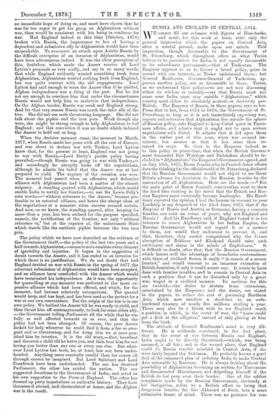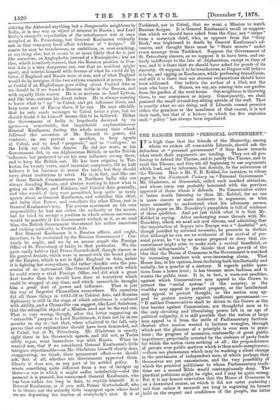RUSSIA AND ENGLAND IN CENTRAL ASIA.
WE cannot fill our columns with digests of Blue-books, and must, for this week at least, state only the general impression which the papers on Central Asia?
after a careful perusal, make upon our minds. This impression, though favourable to the Government of St.. Petersburg, which throughout offers us what Tories believe to be guarantees for India, is not equally favourable to its subordinate government,—that of Turkestan. The Emperor appears to us to favour a broad policy, quite in accord with our interests, as Tories understand them ; but General Kaufmann, Governor-General of Turkestan, ap- proves another policy, not so favourable to them. Tories, as we understand their policy—we are not now discussing either its wisdom or morality—say that Russia must not come near India, must stay outside "Afghanistan," which country must either be absolutely neutral, or decisively pro- British. The Emperor of Russia, in these papers, says so too. From first to last, from 1873 to 1878, the Government of St. Petersburg, so long as it is not immediately expecting war, repeats and reiterates that Afghanistan lies outside the sphere of Russian policy, asks England to keep Cabul quiet in Turco- man affairs, and admits that it ought not to open serious negotiations with Cabul. It admits that it did open them in the earlier part of this year, when war seemed' im- minent; but assures us that it has since thew re- traced its steps. So clear is the Emperor indeed as to this policy in peace-time, that when the British Govern- • ment demanded that Wakshan and Badakshan should be in- cluded in "Afghanistan," the Emperor's Government agreed, and on July 13th, 1875, Baron Jomini,who in Central-Asian affairs does the thinking for the official world of St. Petersburg, declared that the Russian Government would not object to see Great Britain advance its dominion to the Russian frontier by the annexation of all Afghanistan. Here are the words :—" But the main point of Baron Jomini's conversation went to show the fixed idea existing in his mind that the British and Rus- sian Empires must eventually become limitrophe. His Excel- lency repeated the opinion I had the honour to recount to your Lordship in my despatch of the 23rd June, 1875, that if the
Empires of Russia and Austria or Germany, having a common frontier, can exist on terms of peace, why not England and Russia ? And his Excellency said, if England found it to her interests to annex Afghanistan to her Indian Empire, the Russian Government would not regard it as a menace to them, nor would they endeavour to prevent it, and that, therefore, they cannot comprehend why the fi.ture absorption of Bokhara and Khokand should raise such excitement and alarm in the minds of Englishmen." It is difficult to doubt, after that, that the Russian Government, which knows well the advantage of boundaries conterminous with those of civilised States, is really " in search of a secure• frontier," and would consent to an immense extension, of British dominion, if only it could secure one. It wants to have' done with frontier troubles, and to remain in Central Asia in such a position that it can be disturbed only by a great war, waged in a civilised manner. Its motives for this are twofold,—the desire to abstain from extensions, entertained by the Emperor ; and the desire, not stated in the papers, to reduce the cost of governing Northern Asia, which now involves a dead-loss to an over- burdened treasury of nearly five millions sterling a year. There may also be a latent wish to see England reach' a position in which, in the event of war, the "horse could get a kick at the alligator," instead of only glaring at him from the bank.
The attitude of General Kaufmann's mind is very
ferent. He is evidently convinced, in the first place, that in the event of war between Russia and England, India ought to be directly threatened,—which, war. being assumed, is all fair ; and in the second place, that England could do Russia terrible mischief in Central Asia, if she were fairly beyond the Suleiman. He probably knows a good deal of the rumoured plan of ordering India to make Central Asia untenable by Russians. He is always fretting about tte possibility of Afghanistan becoming an asylum for Turcomans and discontented Mussulmans, and fidgetting himself if the British do but peep over their border. One of the oddest complaints made by the Russian Government, obviously at his instigation, refers to a British effort to bring. that dangerous fanatic, the late Akhoond of Swat, into a more submissive frame of mind. There was no pretence for con- sidering the Akhoond anything but a disagreeable neighbour to India, or in any way an object of interest to Russia ; and Lord Derby's energetic repudiation of the interference was at once accepted at St. Petersburg, but General Kaufmann evidently saw in that trumpery local affair evidence of " designs." Of course he may be treacherous, or ambitious, or over-reaching, or anything else, but it seems to us more likely that he is just like ourselves, an Anglophobe, instead of a Russophobe ; has an idea, which is entirely correct, that the Russian position in Cen- tral Asia is a very dangerous one, one that an accident might upset, and worries himself with dreams of what he could do by force, if England and Russia were at war, and of what England would do by intrigue, if the two nations remained at peace. He is as fretful if an Englishman goes riding about Central Asia as we should be if we found a Russian noble in the Deccan, and with equally little reason. He is as nervous as Lord Lytton, and like him, outruns his direct orders. He is always wanting to know what is " up " in Cabul, and get influence there, and keep some sort of Envoy there, if he can. He says officially that he only sends messages to Cabul twice a year, but we should doubt if he himself means this to be believed. Either the Government of India is hopelessly deceived by its agents—a conceivable, but improbable explanation—or General Kaufmann, during the whole uneasy time which followed the accession of Mr. Disraeli to power, did contrive, on one pretext or another, to keep agents at Cabul, and to send "proposals," and to " collogue," as the Irish say with the Ameer. He did not want, as his Government did, to see Afghanistan British, or under British 'influence, but preferred to see his own influence strong there, and to keep the British out. He has been reigning in Tur- kestan for twenty years, amid incessant conspiracy, till he half believes it his business to arrest the birds, lest they should carry about invitations to rebel. He is, in fact, just like one of those British Commissioners in Northern India who are always dreading Russia, and always wanting to know what is going on in Herat, and Bokhara, and Central Asia generally, and who would, if they were permitted, keep quite as many agents about as General Kaufmann, and subsidise this chief, and bribe that Power, and conciliate the other Khan, just in General Kaufmann's way. For serious movement on his own responsibility he had not either the authority or the means, but he tried to occupy a position in which serious movement would be possible if his Government wished, or if, as we read him, the British Government threatened his rather uncertain and rocking authority in Central Asia.
But General Kaufmann is a Russian officer, and ought, therefore, to be restrained by the Russian Government ? Cer- tainly he ought, and we by no means acquit the Foreign Office of St. Petersburg of laxity in that particular. We can quite easily believe that Prince Gortschakoff, though sincere in his general denials, which were in accord with the broad policy of the Empire, which is not to fight England in Asia, unless it is fighting her everywhere, did rather chuckle over the pos- -session of an instrument like General Kaufmann with which he could worry a rival Foreign Office, and did wink a great .deal harder than he should have done at tentatives which -could be stopped at any time, and which meanwhile brought Whim a great deal of power and influence. That is just the way of Imperial Chancellors everywhere. We ourselves did all those things in 1837-38 in Central Asia, and Russian diplomacy is still in the stage at which adroitness is confused with ability, and a Chancellor can suggest, like Lord Salisbury, that the ostensible object of a Mission need not be the real one. That is very wrong, though, after the letter suggesting an "ostensible" purpose to Lord Northbrook, it does not lie in our mouths to say so ; but that, when admitted to the full, only proves that our explanations should have been demanded, not at Cabul, but at St. Petersburg. Mr. Gladstone is exactly right there in his Greenwich speech, and did not, as Tories .sillily argue, want immediate war with Russia. What he wanted was, that if we considered General Kaufmann's little intrigues objectionable—as Mr. Gladstone himself clearly does, exaggerating, we think, their permanent effectwe should ask, first of all, whether his Government approved them. Clearly it does not, as any part of its settled policy. It wants something quite different from a war of intrigue up there—a war in which it might suffer indefinitely—and the moment it is pressed, has summoned General Kaufmann, who has been rather too long in Asia, to explain himself. It is General Kaufmann, or if you will, Prince Gortschakoff, who is to blame, not the unlucky little scapegoat upon whose head we are depositing the burden of everybody's sins. It is at Tashkend, not in Cabul, that we want a Mission to watch Russian designs. It is General Kaufmann's recall or suppres- sion which we should have asked from the Czar, not " terms " from a mountain chief, who, as appears from the " Grey Book," was frightened to death by General Kaufmann's ad- vances, and thought there must be " State secrets" under every message from Tashkend. Suppose the Government of St. Petersburg sincere, as we suppose it to have been, and en- tirely indifferent to the fate of Afghanistan, except in time of war, and it is there that we should have asked for proofs of its sincerity. Or suppose it to be treacherous, as Jingoes will believe it to be, and egging on Kaufmann, while professing friendliness, and still it is there that our sternest reclamations should have been addressed. One indicts the author of a libel, not the man who buys it. Stones, we say, are coming into our garden from the garden of the next house. Our neighbour is throwing them, to our annoyance or injury. Consequently, we shall pummel the small errand-boy sitting astride of the wall. That is exactly what we are doing, and if Liberals cannot perceive either the grandeur or the manliness of that course, it is not their fault, but that of a history in which for five centuries such " policy " has always been repudiated.







































 Previous page
Previous page